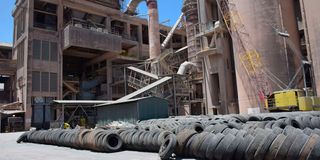
The Bamburi Cement Factory in Mombasa.
A section of minority retail shareholders of Bamburi Cement failed to sell 12.52 million shares worth Sh813.9 million to Tanzanian company Amsons Group in the takeover deal which closed earlier this month, setting them up for a compulsory buyout by March 2025.
Amsons, which is majority controlled by Tanzanian businessman Edhah Abdallah Munif, said it achieved a 96.54 percent success rate (350.4 million Bamburi shares) in its offer, which was priced at Sh65 per share.
The company took possession of the shares in a series of block trades at the Nairobi Securities Exchange (NSE) on Wednesday and Thursday.
Retail investors, numbering 4,599, held 8.48 percent of the company, equivalent to 30.8 million shares as at mid-October.
The bulk of the shares were in the hands of large institutional and high networth investors, led by Swiss firm Holcim with a 58.6 percent stake and 15.68 percent by an unnamed investor through a nominee account at Standard Chartered Bank.
Businessman Baloobhai Patel followed with a stake of 11.12 percent, held through his investment vehicle Aksaya Investment Holding Limited.
Having surpassed the 90 percent acceptance mark, Amsons is now set to make a compulsory acquisition of the remaining shares, a process known as a squeeze out.
The conglomerate also has the option of delisting Bamburi from the NSE, having surpassed the 75 percent acceptance threshold needed to do so.
As per the Amsons offer document, the company will issue the squeeze out notice to the affected shareholders within three months from the last day of the offer period, and buy them out within six weeks of issuing the notice and then delist the company.
The squeeze out price will either be the prevailing market price of the shares or the offer price, whichever is higher. Those buying now from the market are thus looking at some capital gains once Amsons makes the compulsory buyout of the minority shareholders.
The Bamburi share hit a high of Sh58.25 on Friday at the NSE, having opened the day at Sh53, with 16,900 units changing hands in the session.
The offer closed on December 5, with Amsons left as the sole bidder following the late withdrawal of rival bidder Savannah Clinker a day before the offer closure date.
Savannah pulled out its offer days after its chairman Benson Ndeta was arrested and later released over alleged fraud. He later accused the Capital Markets Authority (CMA) and unnamed detractors from the government of contributing to his exit from the Bamburi bid.
Mr Ndeta argued that the arrest had caused his financial backer — US-based infrastructure financier Global Infrastructure Finance & Development Authority (Gifda) — to seek additional due diligence on Savannah, but the CMA declined a request to extend the offer period by 60 days to accommodate the Gifda request.
Following Amsons’ announcement of its bid on July 10, Savannah Clinker put up a counter offer of Sh70 per share on August 27, before raising it to Sh76.55 in October and valuing its bid at Sh27.8 billion.
Investors who had pledged their shares to Savannah before it withdrew its bid were allowed to tender them afresh to Amsons.









